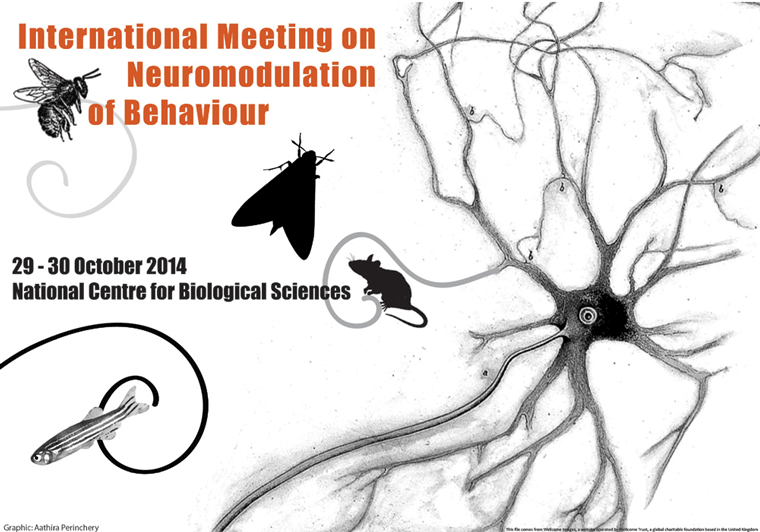International Meeting on Neuromodulation of Behaviour
The International Meeting on Neuromodulation of Behaviour will commence at Bangalore's National Centre for Biological Sciences (NCBS) on 29th October 2014. The two-day conference aims to bring together neuroscientists studying neuromodulatory inputs and how they influence natural behavior in organisms.
Neuromodulation is the process by which a single nerve cell or neuron controls and alters the function of an entire group of neurons through chemicals called neurotransmitters and neuromodulators. It is an interesting field of study, especially so for its ability to influence the natural behavior of organisms. In humans for instance, neuromodulation is responsible for a suite of routine behavior ranging from social interactions, decision-making and learning, to more specific behavior of immense medical interest such as drug addiction and obsessive-compulsive disorder (OCD). Scientists have found that some neuromodulators affect similar behavior in insects as well, including social dominance and even division of labor in honeybees. This wide range of behavior it can influence makes neuromodulation a well-studied topic, with scientists studying the process across humans, rats, fish and insects including moths, bees and fruit flies.
The intricacies of how neuromodulation works across such organisms is precisely what the International Meeting on Neuromodulation of Behaviour at NCBS will focus on. The schedule consists of lectures by leading scientists from across India, Europe and the United States, including Rozi Andretic (University of Rijeka, Croatia), Gaiti Hasan (NCBS, India), Aurnab Ghosh (IISER, Pune) and Christian Wegener (Universitat Wuerzberg, Germany) among others (click here to access the entire list of speakers).
"This Meeting is being organized with the idea of raising the level of interest in behavioral genetics in India," says Hasan, Senior Professor at NCBS and Scientific Organizer of the conference. "The meeting will bring together international and Indian scientists who work on a range of organisms where genetics has helped understand specific behavioral paradigms."
For this very reason, this international conference will prove to be different from similar meetings worldwide. "I think it promises to be unique by bringing together people who might otherwise not end up discussing their work with each other at the larger international meetings on neuromodulation," says Vidita Vaidya, Associate Professor at the Department of Biological Sciences, Tata Institute of Fundamental Research (Mumbai, India), one of the invited speakers for the conference. "Most meetings on neuromodulation tend to bring together groups that work largely with similar model organisms. But the diversity of organisms represented at the meeting in NCBS is great." This, she believes, would contribute towards useful discussions on how neuromodulatory influences vary across diverse organisms.
"Such workshops unfailingly generate insights - both through lectures and more importantly through personal interactions among participants - by learning about tools, techniques, and approaches to science," agrees Sanjay Sane, Associate Professor at NCBS. "It also serves to get students interested in such problems in the early stages of their career. From that perspective, it's importance is immeasurable." Sane, whose interests include studying how neuromodulators may be involved in "turning on" various aspects of insect flight during flight onset, will be speaking about the role of neuromodulation on insect flight behaviour. "We will all benefit from hearing what various presenters think and have found out about how neuromodulation affects their specific areas of interest," he opines.
Fifty participants from across the country have been shortlisted to take part in the conference. Participants can speak about their latest and ongoing research projects on neuromodulation and behavior through short talks or through poster sessions. The conference is supported by The Company of Biologists, the Department of Biotechnology and the Department of Science and Technology.

Comments
Post new comment